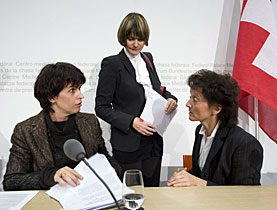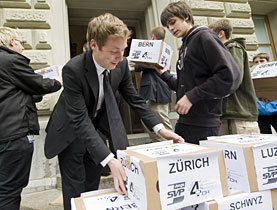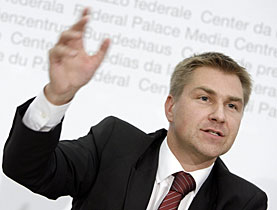Campaign launched ahead of EU labour vote

Three government ministers have underlined the economic and political importance of a key labour treaty between Switzerland and the European Union.
They appealed to voters to back a parliamentary decision to continue the accord and extend it to the latest EU member states, Bulgaria and Romania, in a nationwide referendum scheduled for next February.
It is the third time since 2000 that the electorate will vote on the labour treaty, also known as the free movement of people accord.
The rightwing Swiss People’s Party is the only main political party to oppose the agreement. All the other main parties, including dissident members of the People’s Party, as well as the business community have all come out in favour.
Launching the government’s campaign ahead of the vote on February 8, Economics Minister Doris Leuthard, Justice Minister Eveline Widmer-Schlumpf and Foreign Minister Micheline Calmy-Rey pointed out the significance of the labour treaty in times of economic uncertainty.
“A rejection of the labour treaty would increase insecurity for Switzerland’s key export industry,” said Leuthard.
She added that the free movement of people was crucial for Swiss companies to keep their competitive edge.
“It is in Switzerland’s interest to be able to recruit staff across Europe because we have a shortage of highly-qualified people in some sectors,” Leuthard said.
The free movement accord, in force since 2002, has boosted the economy by at least one per cent – or up to SFr5 billion ($4.2 billion) annually, according to the government.
Leuhard dismissed allegations that an extension of the labour treaty to Romania and Bulgaria would lead to an increase in unemployment.
“Switzerland has six years of experience with the free access to the labour markets. It has paid off for businesses and employers.”
Stability
Foreign Minister Calmy-Rey said in times of financial and economic uncertainty it was vital to opt for stability and favourable conditions in relations with the EU – Switzerland’s most important economic partner.
“The bilateral treaties are our most efficient programme to boost the economy,” she said.
Calmy-Rey said accords on transport, agriculture, research and the public procurement with the EU would automatically become null and void if voters reject the continuation and extension of the labour treaty in February.
“It is unrealistic to assume that we would be a in a strong position to renegotiate the treaties,” she pointed out, adding that Brussels could put pressure on Switzerland, notably in tax matters.
Calmy-Rey said voters were free to speak their minds at the ballot box but called on them to bear in mind the impact of a rejection.
“Switzerland stands to lose more than the EU,” she said.
For her part, Justice Minister Widmer-Schlumpf said it was Switzerland’s idea to opt for bilateral treaties – rather than join the EU – and it was worth continuing this policy.
The three ministers said they were taking seriously concerns from opponents of the labour treaty, particularly about a wave of immigrants from Bulgaria and Romania.
Widmer-Schlumpf stressed that only people with valid work contracts, self-employed or those who do not depend on welfare are allowed to settle in Switzerland.
She added that the introduction of the accord would be staggered over seven years and access to the labour market only be free in 2016 for Romanians and Bulgarians.
Scare mongering
But the People’s Party dismissed the arguments, saying the government was dishonest and was trying to intimidate voters.
“The government puts pressure on voters and does not hesitate to tell lies and half-truths,” a party statement said on Monday.
Last week, delegates of the People Party came out against the accord saying it was undemocratic to lump into one bill the continuation of the treaty and the extension to Romania and Bulgaria.
The party leadership initially refused to support the campaign by the youth chapter of the party and several groups to the far-right to collect the necessary signatures for a referendum, but later changed its policy.
swissinfo, Urs Geiser

More
Free movement of people
Voters approved the labour treaty with the old 15 EU member states with a 67% majority in 2000. It took effect from 2002.
A second vote, extending the labour treaty to ten new member states with a 56% majority in 2005.
In 2009 voters will decide on continuing the accord and extending it to the latest two EU member states.
Switzerland is not a member of the EU, but it concluded 20 major bilateral accords with the 27-nation bloc.
There are also about 100 secondary bilateral accords between Bern and Brussels.
Negotiations are underway for a bilateral treaty aimed at regulation access to cross-border electricity and a free trade accord on agriculture.
In 1992 voters rejected a plan to join the European Economic Area (EEA), a halfway house to full EU membership.

In compliance with the JTI standards
More: SWI swissinfo.ch certified by the Journalism Trust Initiative




You can find an overview of ongoing debates with our journalists here. Please join us!
If you want to start a conversation about a topic raised in this article or want to report factual errors, email us at english@swissinfo.ch.